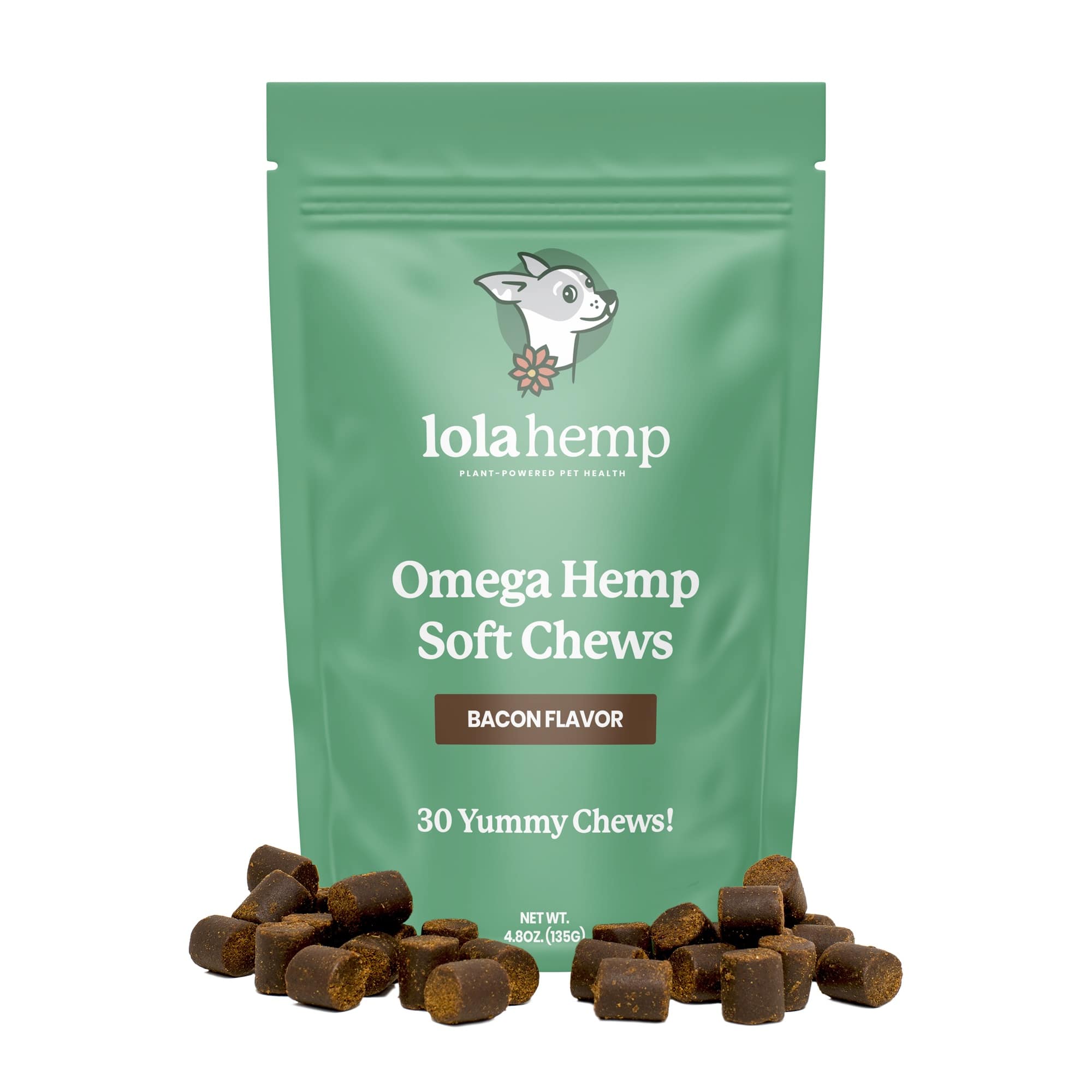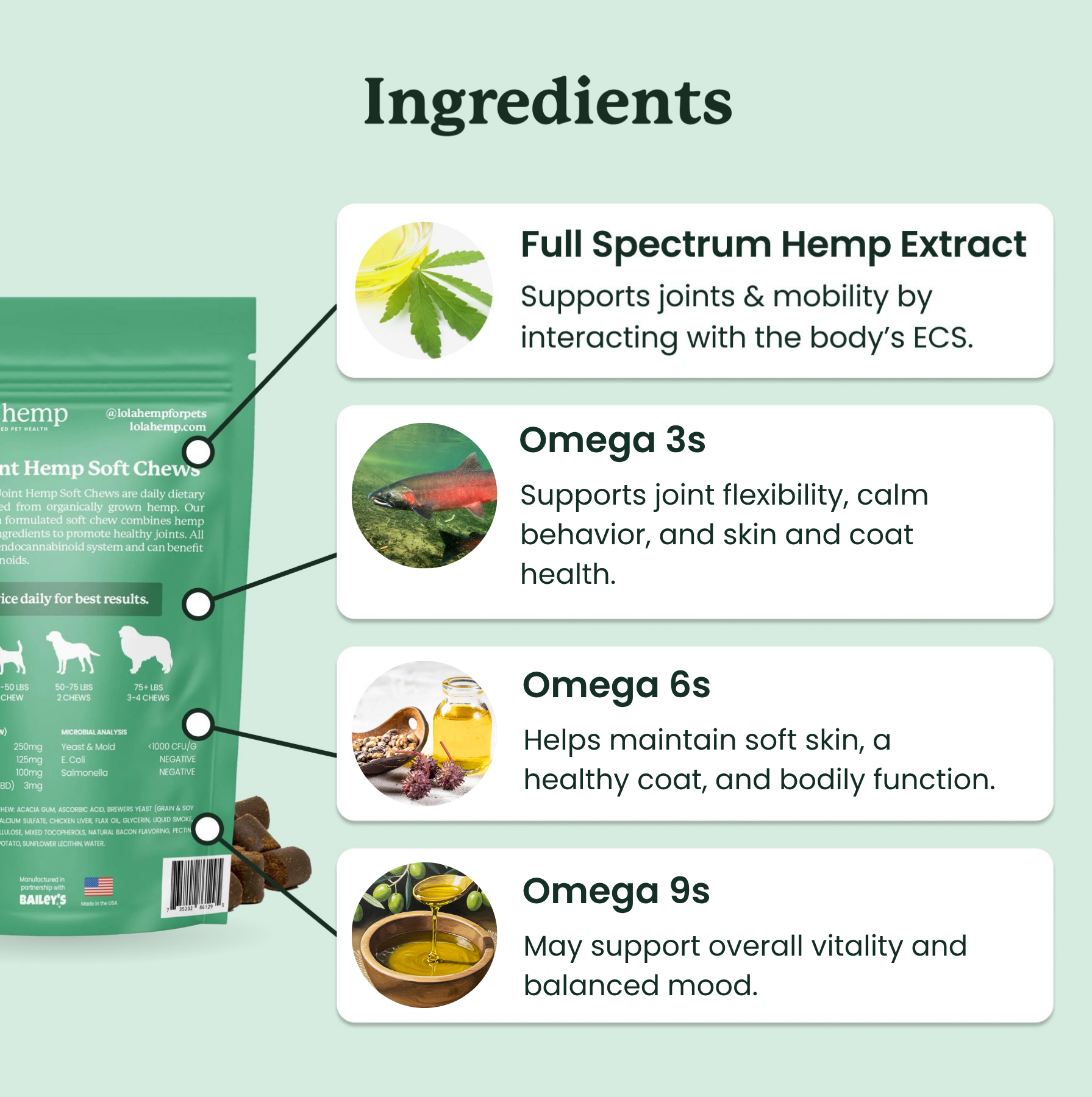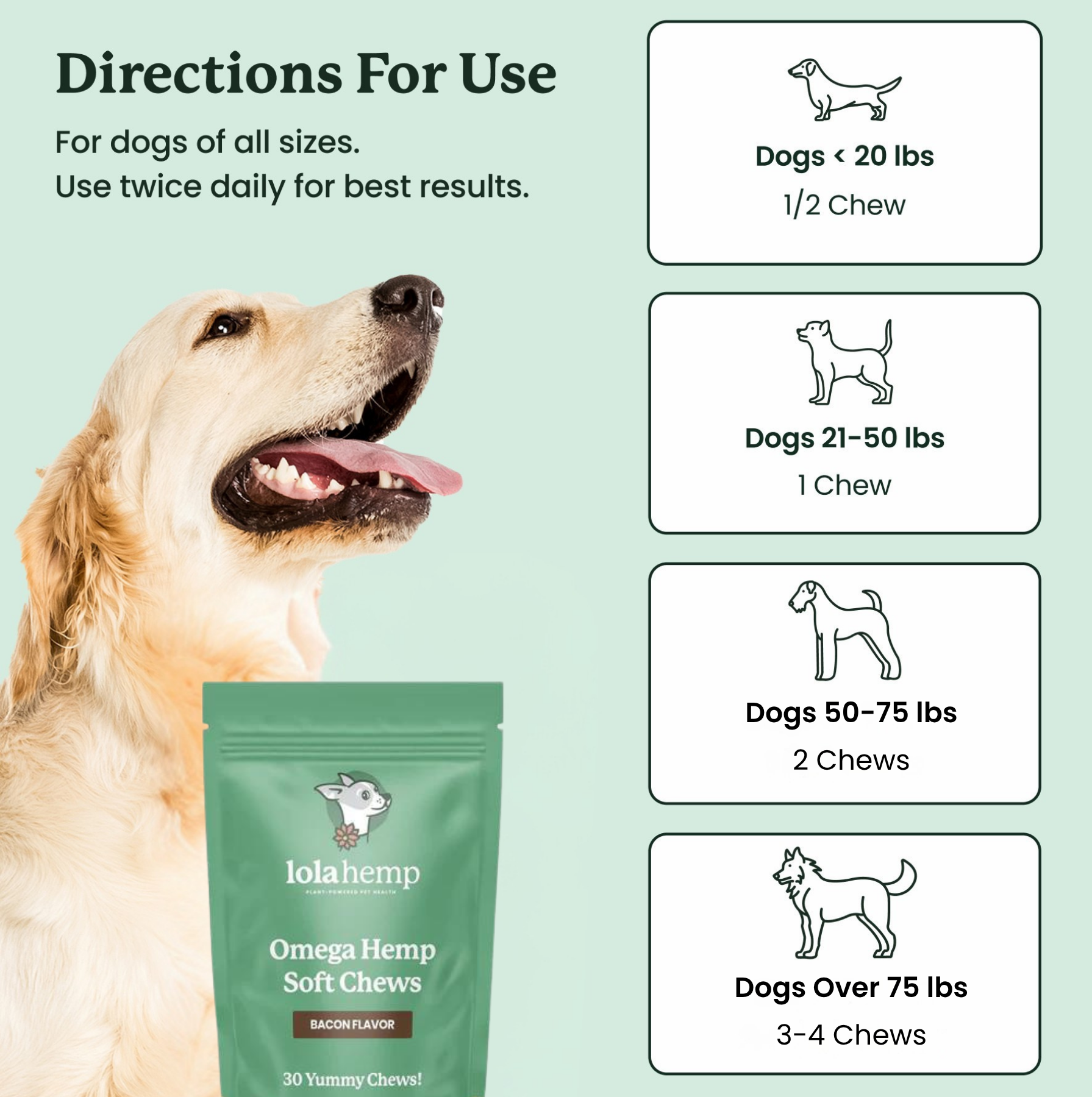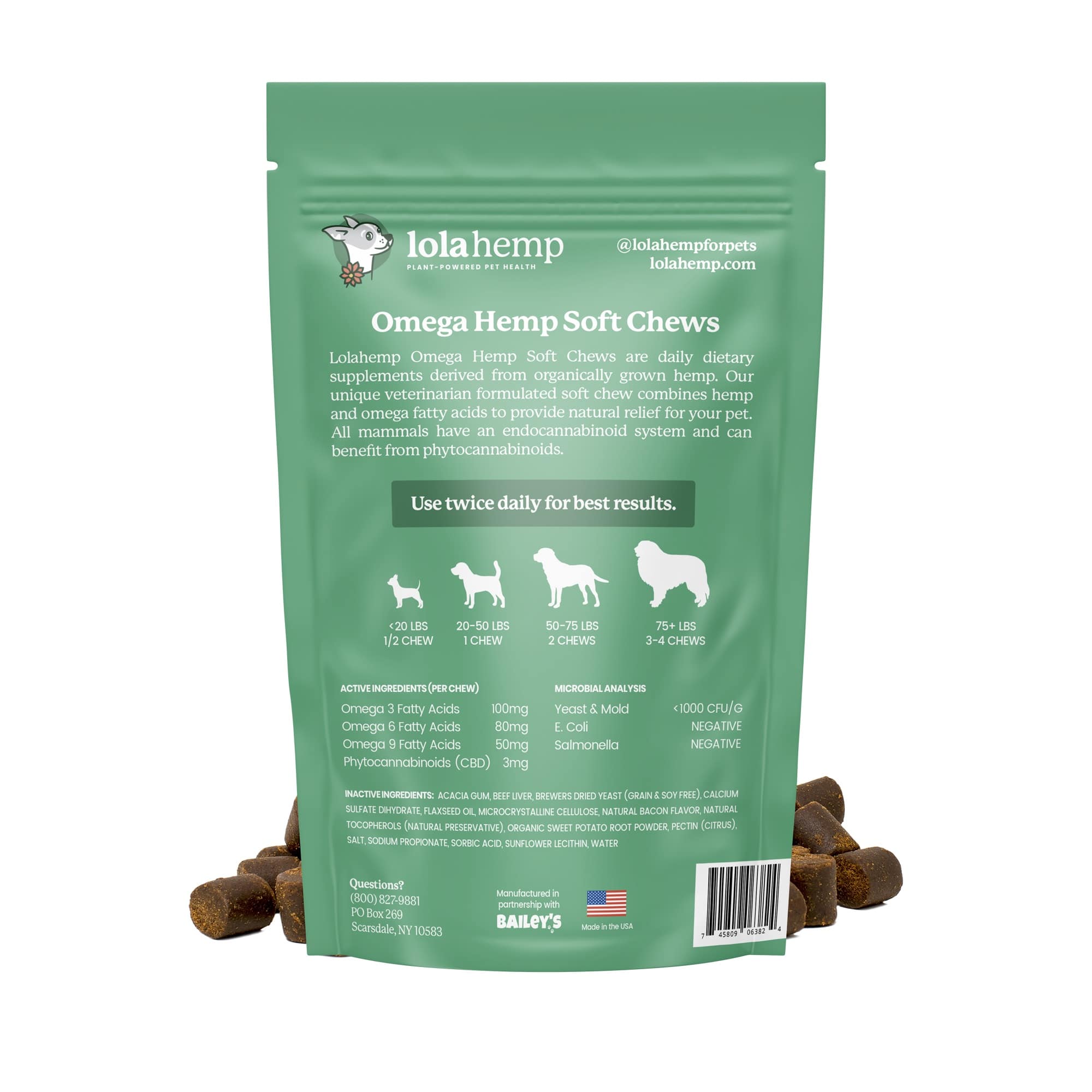Eicosapentaenoic acid, commonly known as EPA, is a type of omega-3 fatty acid found in fish oil that plays a crucial role in maintaining optimal health in dogs. In the world of veterinary medicine, EPA supplements have gained popularity in recent years due to their potential benefits for dogs' skin, coat, joints, and overall well-being.

Docosahexaenoic acid (DHA) is another important omega-3 fatty acid that plays a significant role in the health and well-being of dogs. Like EPA, DHA is considered an essential nutrient for dogs because they cannot synthesize it in sufficient amounts on their own and must obtain it from their diet. DHA is particularly beneficial for brain development, cognitive function, eye health, and overall wellness in dogs.
In this comprehensive guide, we will cover the benefits, uses, considerations, and safety aspects of EPA and DHA as dietary supplement options for dogs.
Understanding EPA and DHA for Dog Nutrition
EPA and DHA are fatty acids found naturally in whole fish with beneficial effects on human and animal nutrition. Oily fish such as salmon, mackerel, sardines, anchovies, herring, and trout are particularly high in these omega-3 polyunsaturated fatty acids. As crucial components of a balanced diet, EPA and DHA contribute to various aspects of a dog's health and well-being as shown below.

The following list illustrates the benefits of EPA for dogs:
Essential Fatty Acid
EPA is classified as one of the essential fatty acids, meaning that dogs cannot synthesize it within their bodies and must obtain it from their diet. Along with docosahexaenoic acid (DHA) and alpha-linolenic acid (ALA), EPA is one of the three main omega-3 fatty acids required for proper canine nutrition.
Cellular Structure and Function
EPA is a structural component of cell membranes, contributing to membrane fluidity and integrity. This is vital for cellular communication, signaling pathways, and overall cell function. Adequate EPA intake ensures that cells can maintain their structural integrity and perform their functions optimally.
Inflammation Regulation
One of the most well-known benefits of EPA is its anti-inflammatory properties. It serves as a precursor to specialized pro-resolving mediators (SPMs), such as resolvins and protectins, which help regulate inflammation and promote the resolution of inflammatory processes. Inflammation is a natural response to injury or infection, but chronic inflammation can contribute to various health issues. EPA helps modulate the inflammatory response, making it beneficial for dogs with inflammatory diseases like cardiovascular disorders, arthritis, allergies, chronic kidney disease, and skin disorders.

Cardiovascular Health
EPA plays a crucial role in cardiovascular health by maintaining normal heart function and circulation. It helps reduce triglyceride levels in the blood, which is beneficial for dogs prone to hyperlipidemia (high levels of fats in the blood). Additionally, EPA supports blood vessel health, improves blood flow, and may help reduce the risk of cardiovascular diseases such as atherosclerosis and hypertension.
Brain and Cognitive Function
Omega-3 fatty acids, including EPA, are important for brain development in puppies and support cognitive function in adult and senior dogs. EPA is involved in forming nerve cell membranes and producing neurotransmitters, which are essential for proper brain function, learning, and memory. Adequate EPA intake may contribute to enhanced cognitive abilities and mental acuity in dogs.
Skin and Coat Health
EPA is beneficial for maintaining healthy skin and coats in dogs. It helps reduce inflammation in the skin, which can alleviate symptoms associated with allergic dermatitis, such as itching, redness, and flakiness. Additionally, EPA contributes to the production of oils that keep the skin moisturized and the coat lustrous. Dogs receiving sufficient EPA in their diet often exhibit healthier skin, reduced shedding, and a shinier coat.
Immune System Support
EPA plays a role in modulating the immune response, which is important for dogs with autoimmune disorders, allergies, or other immune-mediated conditions. By regulating inflammation and supporting immune function, EPA helps maintain a balanced immune system that can effectively respond to pathogens while avoiding excessive inflammatory responses that can harm the body's tissues.
DHA fish oil products offer the following benefits:
Brain Development and Cognitive Function
DHA is a critical component of brain tissue and plays a vital role in brain development, especially during puppyhood. Adequate DHA intake is essential for the development of neural structures, synaptic connections, and overall brain function. DHA supports cognitive abilities such as learning, memory, problem-solving, and motor skills in dogs of all ages. It may also help delay cognitive decline in senior dogs, contributing to enhanced mental acuity and quality of life.
Eye Health and Vision
DHA is a major structural component of the retina, the light-sensitive tissue in the eye. It plays a crucial role in maintaining optimal eye health, visual function, and retinal integrity. Adequate DHA levels support retinal development, and visual acuity, and may help protect against age-related eye conditions in dogs. Any supplement derived from DHA is beneficial for promoting healthy eyes and supporting overall vision.
Skin and Coat Health
While EPA is primarily associated with skin health, DHA also contributes to skin integrity and coat condition in dogs. DHA helps maintain the skin's natural barrier function, supports skin hydration, and promotes a healthy, shiny coat. Combined with EPA, DHA supplementation can improve skin and coat health, reduce itching, and enhance overall appearance.
Inflammation Regulation
EPA and DHA act as anti-inflammatory agents in the body. DHA helps regulate immune function, reduce excessive inflammation, and promote the resolution of inflammatory processes. DHA supplementation may benefit dogs with inflammatory conditions, allergies, autoimmune disorders, or inflammatory bowel disease by supporting a balanced immune system and mitigating inflammatory symptoms.
Cardiovascular Support
While EPA is more closely associated with cardiovascular health, DHA also plays a role in supporting heart function and circulation. DHA helps maintain healthy blood lipid profiles, supports blood vessel health, and contributes to cardiovascular wellness. Combined supplementation derived from EPA and DHA can provide comprehensive cardiovascular support for dogs at risk of heart disease or those with cardiac conditions.

Pregnancy and Lactation
DHA is crucial during pregnancy and lactation for optimal development of puppies' brains and nervous systems. Pregnant and nursing dogs require higher levels of DHA to support the healthy growth and development of their offspring. Fish oil supplementation during pregnancy and lactation will benefit both the mother and her puppies, ensuring proper neural and cognitive development.
Joint Health
While EPA is more commonly associated with joint health, DHA also contributes to maintaining joint lubrication and cartilage integrity. It supports overall joint function, mobility, and comfort, especially when combined with EPA in omega-3 fish oil supplements. Supplementation derived from DHA can be beneficial for animals with arthritis, joint stiffness, or feline degenerative joint disease.
Choosing the Right EPA Supplement
Here are some key factors to consider when selecting an EPA supplement for your canine companion:

-
Source of EPA: Look for EPA supplements derived from high-quality fish oil sources, such as salmon, anchovies, sardines, or krill. These fish oils are rich in EPA and other omega-3 fatty acids. Ensure that the fish oil used is of pharmaceutical-grade quality and obtained from reputable manufacturers that follow strict quality control standards.
-
The concentration of EPA and DHA: Check the concentration of EPA and DHA in the supplement, typically measured in milligrams (mg) per serving. Higher concentrations mean you may need smaller doses to achieve the desired intake of omega-3s for your dog. The possible dangers of using omega-3 fatty acids in high doses include altered platelet function, weight gain, diarrhea, vomiting, and delayed wound healing.
-
Formulation and Administration: Consider the formulation of the supplement, such as liquid, capsules, soft chews, or flavored oils. Choose a form that is easy to administer and palatable for your canine companion. Animals tend to prefer liquid supplements mixed with food, although some may find capsules or soft chews more convenient.
-
Purity and Quality: Look for supplements that undergo third-party testing for purity, potency, and quality. Check for certifications from reputable organizations such as the International Fish Oil Standards (IFOS) or the National Animal Supplement Council (NASC) Quality Seal. Ensure the supplements are free from contaminants and meet safety standards.
-
Additional Ingredients: Consider supplements that may contain additional beneficial ingredients such as antioxidants (e.g., vitamin E), joint-supporting compounds (e.g., glucosamine, chondroitin), or skin and coat enhancers (e.g., biotin). These additional ingredients, making up a therapeutic diet, can provide added health benefits for your dog, depending on their specific needs.
-
Dosage Guidelines: Follow the dosage guidelines provided by the supplement manufacturer or your veterinarian. Avoid giving excessive amounts of EPA and DHA, as overdosing can lead to adverse effects. Monitor your dog's response to the supplement and consult with your vet if you have any concerns or questions.
-
Consultation with a Veterinarian: Always consult with your veterinarian before starting any new supplement regimen for your dog. Your vet can provide personalized advice, recommend specific EPA and DHA supplements based on your dog's needs, and monitor their response to the supplement over time. Inform your vet about any existing health conditions, medications, or dietary restrictions your dog may have.
Administration and Safety Considerations
Although EPA supplements offer numerous health benefits, it's essential to follow guidelines and consult with a veterinarian to ensure the safe and effective use of these supplements. Below are some important administration and safety considerations:

Dosage Guidelines
Pet parents must consult their veterinarian to determine the appropriate fish oil dosing for their canines. Dosage recommendations may vary based on your dog's body weight, age, health condition, and specific nutritional needs. Avoid self-prescribing or guessing the dosage, as giving too much or too little EPA can impact its effectiveness and may lead to adverse effects.
Administration Methods
EPA supplements come in various forms, including liquid, capsules, soft chews, and flavored oils. Choose a form that is convenient for your dog and easy to administer. Some dogs may prefer liquid supplements mixed with their food, while others may find capsules or soft chews more palatable. Administer the supplement according to the manufacturer's instructions or your veterinarian's guidance.
Mixing with Food
If using a liquid EPA supplement, you can mix it with your dog's food to make administration easier. Ensure that the supplement is evenly distributed in the food, and monitor your dog to ensure they consume the entire meal containing the fish oil supplement.
Direct Administration
For capsules, soft chews, or flavored oils, administer the supplement directly to your dog. You can offer it as a treat or hide it in a small amount of food to encourage consumption. Ensure that your dog swallows the supplement and doesn't just chew and then spit it out.
Dosage Timing
Administer EPA supplements as directed by your veterinarian. Some supplements may be given once daily, while others may require multiple doses throughout the day. Follow the recommended dosage schedule to maintain consistent levels of omega-3 fatty acids in your dog's system.
Monitoring for Side Effects
While EPA fish oil supplements are generally safe for dogs, sometimes stomach upset occurs with symptoms such as loose stool or diarrhea. Monitor your dog for any adverse reactions after starting the dietary supplementation. If you notice persistent or severe side effects, discontinue the supplement and consult your veterinarian.
Interaction with Medications
Inform your veterinarian about any medications your dog is taking, as EPA fish oil supplements may interact with certain drugs, especially blood thinners or medications that affect blood clotting. Your vet can assess the potential for drug interactions and adjust medication dosages if necessary.
Storage
Store any EPA fish oil supplement in a cool, dry place away from direct sunlight to maintain its potency and prevent spoilage. Follow the storage instructions provided by the manufacturer to ensure the supplements remain effective throughout their shelf life.

The Bottom Line
EPA (eicosapentaenoic acid) and DHA (docosahexaenoic acid) fish oil supplements offer significant health benefits for dogs. According to the National Research Council, these omega-3s are essential for dogs' well-being, supporting brain development, cognitive function, eye health, cardiovascular wellness, joint mobility, skin integrity, and immune modulation. Their therapeutic use in veterinary patients extends to managing conditions like arthritis, allergies, inflammatory skin disorders, and cognitive decline in senior dogs.
EPA and DHA also play a crucial role in wound healing and immune system function, with studies showing their positive effects on altered immune function and inflammatory response. These fatty acids are found naturally in fish oil sources, making them easily accessible for supplementation in canine diets. Incorporating EPA and DHA into your dog's diet will contribute significantly to their overall health and vitality across life stages.
EPA for Dogs: Frequently Asked Questions
Is EPA safe for dogs?
Yes, EPA is generally considered safe for most dogs when given in the correct dosage under veterinary guidance.
How does EPA benefit dogs?
EPA supports skin and coat health, reduces inflammation, aids joint mobility, supports cardiovascular wellness, and helps regulate immune response.
Can dogs take EPA and DHA together?
Yes, EPA and DHA are often combined in fish oil supplements and work together to support brain health, inflammation control, and overall wellness.
How long does it take for EPA to work in dogs?
Most dogs show improvements in coat quality, inflammation, and mobility within 4–6 weeks of consistent EPA supplementation.
Are there risks to giving too much EPA to dogs?
Excess EPA may cause diarrhea, vomiting, delayed wound healing, or blood clotting issues, so proper dosing is important.










